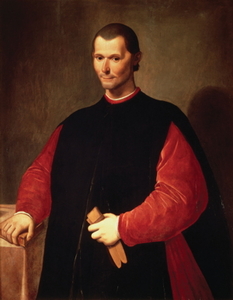Liberty Matters
Is Machiavelli a Friend or Foe to Liberty?: Reflections on My Colleagues’ Essays
 The four essays in this collection are a good indication of the varying responses that people interested in the idea of liberty can have to Machiavelli’s thought.
The four essays in this collection are a good indication of the varying responses that people interested in the idea of liberty can have to Machiavelli’s thought. Habib, relying upon the 1971 essay of Marcia Colish, summarizes the ways that liberty is used in Machiavelli’s thought. Through a reading of Machiavelli’s play Mandragola, Habib argues that one also can find an argument for sexual liberation along with other kinds of liberty identified by Colish. I find this approach to understanding Machiavelli’s contribution to the study of liberty to be helpful but needlessly limiting. Like Colish, Habib offers a list of how Italian words standing for liberty are used in Machiavelli’s work without explaining what these distinctive usages tell us about the larger idea of liberty that might tie them together. Habib’s conclusion that using liberty in a variety of ways makes Machiavelli a “friend of liberty” is suggestive but needs expansion.
Hull’s essay draws attention to the parallels between Machiavelli’s times and our own. A self-governing free political community must be powerful enough to throw off the oppression of outside forces. To be a free self-governing city demands political leaders that act and make difficult, even horrific, decisions. While Hull welcomes Machiavelli’s discussion of the problem of liberty in the Discourses, she seems to be troubled by some of the arguments about the use of power to achieve political freedom in The Prince. Her essay concludes with a reflection on Machiavelli’s use of the quote from Petrarch at the end of The Prince: “Virtue will take up arms against fury/and make battle short/ because the ancient valor in Italians hearts/is not yet dead.” Then she extends the quotation to include the final words of Petrarch’s poem that Machiavelli did not include in The Prince: “Seek your fortune among those favorable to true peace. / Say to them: ‘Who will defend me? I go calling out: Peace. Peace. Peace.” Hull appears to be missing the rhetorical move that Machiavelli is making. Wrenching Petrarch’s quote out of context, Machiavelli has transformed it from a call for peace to one for war and for political leadership that understands the realities of power. For Machiavelli, peace and freedom are only possible if a prince and a city are willing to wage war in the most horrible of ways.[1]
Hartley’s essay pursues an entirely different approach from either Habib or Hull. He asks “How, then, can a society achieve liberty?” He offers what he sees to be Machiavelli’s answer: people of a free city have parochial utilitarian concerns about liberty to protect their property and to live with their families in security. Prosperity and security are what liberty means to the people of a city. Princes can rely on this as a means to power. The problem for Hartley is that Machiavelli’s support for liberty is a means to an end, not an end in-itself. By pursuing freedom for the people, a prince maximizes his own power, not the freedom and prosperity of others in a society. But, Hartley warns, princes easily can become corrupted and turn against liberty and the free society, thus making princes, for Hartley, foes to liberty. Here I briefly part ways with Hartley. In contrast to Hartley, I believe that Machiavelli has a substantive notion of political liberty as an end in itself that links together the actions of a prince and the existence of a free city. People are free because they participate in a free city, not just because their properties and families are secure, but because their participation in public life makes them free. As I argued in my essay, the substantive political liberty of a free city founded by a Machiavellian prince does not necessarily include a commitment to the personal liberties and prosperity of the individuals who live in that city.
Endnote
[1] See Petrarch, The Canzoniere Poem 128. https://petrarch.petersadlon.com/canzoniere.html?poem=128. For an enlightening discussion of Machiavelli’s use of the Petrarch quote see Mikael Hörnqvist Machiavelli and Empire. Cambridge: Cambridge University Press, 2004. Pp.257-58.
Copyright and Fair Use Statement
“Liberty Matters” is the copyright of Liberty Fund, Inc. This material is put on line to further the educational goals of Liberty Fund, Inc. These essays and responses may be quoted and otherwise used under “fair use” provisions for educational and academic purposes. To reprint these essays in course booklets requires the prior permission of Liberty Fund, Inc. Please contact oll@libertyfund.org if you have any questions.